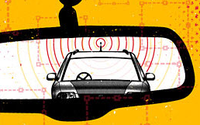Commentary
Connected Cars: Infotainment Revenue Heading To $600 Million
- by Chuck Martin , Staff Writer, January 25, 2016
 While many view the idea of connected cars as moving to autonomous
or self-driving vehicles, the bigger short-term reality is that it will deal more with communications and entertainment for the people in the car.
While many view the idea of connected cars as moving to autonomous
or self-driving vehicles, the bigger short-term reality is that it will deal more with communications and entertainment for the people in the car.
And there’s some significant revenue potential in the messaging that consumers in cars receive.
In-vehicle infotainment systems will produce revenues exceeding $600 million within four years, according to a new study from Juniper Research.
Consumer adoption will rapidly grow as Apple CarPlay and Android Auto gather traction, according to the report.
And that adoption is expected to lead to a new wave of new applications specifically designed for in-vehicle use, such as in-vehicle gaming and advanced traffic solutions.
The big change coming is the lack of a need for a smartphone to make the connection for the things in the car.
Until now, the smartphone has been the hub of the connected car. That wireless functionality is starting to be moved to the vehicle itself.
As people demand more technology in their cars, so-called OTT (over the top) players such as Apple and Google will play an ever more central role in the development of connected car activities, according to Juniper.
Along with the new streaming services in cars will come the challenge of high consumer expectations.
For example, Apple and Google are set to deliver a new application ecosystem so consumers can download new services directly through a car’s head unit. Consumers will expect the same levels of speed, functionality and services they now get from their smartphone providers.
And not be left out, Amazon recently announced that its voice controlled smart service Echo will be able to interact with Ford’s Synch in-vehicle system, another signal that connected cars and smart homes will be linked to each other.
In the driverless car department, the leaders, in order, are: Google, Volvo, Daimler, Tesla and Apple, according to the Juniper ranking.
Google was ranked first since it has the longest time and highest amount of autonomous miles driven on public roads.
Well before cars become driverless, the current drivers and passengers can expect to receive much more of an assist from things that connect through their vehicles.



